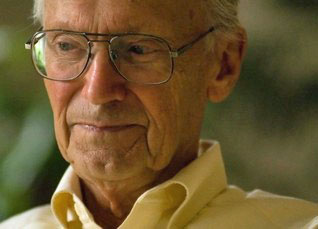
The cryptographer: Hervie Haufler
SUNDAY, SEPTEMBER 23, 2007
ENGLAND, 1944
Most men and women who served in World War II never took part in combat. By one count, eight soldiers worked behind the lines for every front-line soldier.
Hervie Haufler, previously a 23-year-old copywriter at General Electric, became one of those cogs in the machinery of war.
Rejected by the Army and Navy because of his poor eyesight, he enlisted in the U.S. Signal Corps, trained as a cryptographer and was dispatched to England in late 1943 as part of the 6811th Signal Security Detachment.
He spent the war living and working at Hall Place, a largely unheated, 500-year-old British manor house southeast of London.
On his days off, he could take the train into London or bicycle through the countryside of Kent. Haufler remembers D-Day: He was on KP, cleaning garbage cans, when American planes roared over, just above the roof, headed for Normandy.
Inside Hall Place, operators in his radio intercept group sat at long wooden tables in the grand dining room, listening in on German army and Luftwaffe communications and copying down the coded messages.
In an anteroom, Haufler took telephone calls from a mysterious place known only as “Station X,” alerting his unit to the Germans’ twice-daily changes in the frequencies and call signs. He relayed intercepted radio messages—long strings of five-letter code groups—back to “Station X.”
Staion X remained a mystery because cryptographers were told only what they needed to do their jobs.
“I was a private first class, so my need to know was very, very small,” he recalled recently, “We had to take it on faith that the codes were being broken.”
Then came the Battle of the Bulge in December 1944, when Germans achieved complete surprise and pushed back Allied troops. “All these terrible things began to happen—we began to really question whether our whole operation was a complete charade,” he said. He feared the intercepted messages were being ignored or had resisted decoding.
After the war, Haufler was required to sign a promise never to divulge his work, a pledge he kept for 30 years, until the British themselves revealed the “secret war” waged by their codebreakers.
Then, he learned that “Station X” was Bletchley Park, the center of British cryptography, where codebreakers decoded thousands of German military messages and gave Allied commanders precise knowledge of enemy movements.
Germans were able to achieve surprise in the Bulge, Haufler learned, because Hitler had banned the use of radios before the attack.
Haufler became fascinated by the work in which he had had a small part. After his retirement from the copywriting business, he researched and wrote "Codebreakers’ Victory," published by Penguin’s in 2003. A second book on World War II espionage appeared in 2006.
Today, at 88, Haufler is working on a third.
Despite his doubts during the war, he said, “In retrospect, we felt we made a contribution.”
